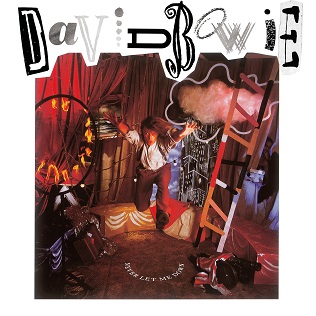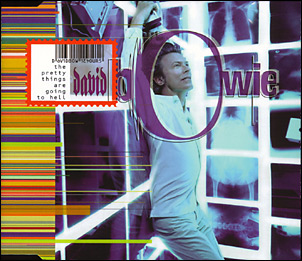
God Bless Tiny Tim is the debut album by Tiny Tim. Released in 1968 on the Reprise label, it included "Tiptoe Through The Tulips", a version of "I Got You Babe", and a collection of obscure songs. Many of the songs have humorous lyrics, are sung for humorous effect, or have an unexpected hook. It is widely praised, but was not released on CD until 1998, and even then, only in Japan. It later was re-released on CD in 2013 with a number of bonus tracks that include alternate and instrumental versions of the album's songs as well as non-album singles.

Hunky Dory is the fourth studio album by the English musician David Bowie, released in the United Kingdom on 17 December 1971 through RCA Records. Following a break from touring and recording, Bowie settled down to write new songs, composing on piano rather than guitar as in earlier works. Bowie assembled guitarist Mick Ronson, bassist Trevor Bolder, and drummer Mick Woodmansey, and began to record a new album in mid-1971 at Trident Studios in London. Rick Wakeman contributed on piano shortly before joining Yes. Bowie co-produced the album with Ken Scott, who had engineered Bowie's previous two records.

Reality is the 24th studio album by the English musician David Bowie, originally released in Europe on 15 September 2003, and the following day in America. His second release through his own ISO label, the album was recorded between January and May 2003 at Looking Glass Studios in New York City, with production by Bowie and longtime collaborator Tony Visconti. Most of the musicians consisted of his then-touring band. Bowie envisioned the album as a set of songs that could be played live.

Outside is the 20th studio album by the English musician David Bowie, released on 25 September 1995 through Virgin Records in the United States and Arista Records, BMG and RCA Records in other territories. Reuniting Bowie with musician Brian Eno following the late 1970s Berlin Trilogy, the two were inspired by concepts "outside" the mainstream, such as various outsider and performance artists. Recorded throughout 1994, the experimental sessions saw Bowie conceive a world where "art crimes", such as murder, pervade society. The resulting Leon project initially faced resistance from labels due to its uncommercial nature. The project's bootlegging led to additional sessions in 1995 to revise the concept and record more commercial material, inspired by a diary Bowie wrote for Q magazine.

Heathen is the 23rd studio album by the English musician David Bowie, originally released in Europe on 10 June 2002, and the following day in America. His first release through his own ISO label, it reunited Bowie with producer Tony Visconti for the two's first full-album collaboration since 1980. Recording took place at New York studios from August 2001 to January 2002 and featured guest musicians including Dave Grohl and Pete Townshend. Two tracks, "Afraid" and "Slip Away", evolved from Bowie's shelved Toy project, while three were covers of songs by Pixies, Neil Young and the Legendary Stardust Cowboy.

Never Let Me Down is the 17th studio album by the English musician David Bowie, released on 21 April 1987 through EMI America Records. Co-produced by Bowie and David Richards and featuring guitarist Peter Frampton, the album was recorded in Switzerland and New York City from September to November 1986. Bowie's goal for the project was to record it differently following his disappointment with 1984's Tonight. Musically, Never Let Me Down has been characterised as pop rock, art rock and hard rock; Bowie himself considered the record a return to rock and roll music. The cover artwork features Bowie surrounded by numerous elements from the songs.

Black Tie White Noise is the 18th studio album by the English musician David Bowie, released on 5 April 1993 through Savage Records in the United States and Arista Records in the United Kingdom. Conceived following Bowie's marriage to model Iman and the disbandment of his rock band Tin Machine, it was recorded throughout 1992 between studios in Montreux, Los Angeles and New York City. Bowie co-produced with his Let's Dance (1983) collaborator Nile Rodgers, who voiced dissatisfaction with the project in later decades. The album features several guest appearances, including previous collaborators Mike Garson and Mick Ronson, and new arrivals Lester Bowie and Chico O'Farrill.

The Buddha of Suburbia is the 19th studio album by the English musician David Bowie, originally released on 8 November 1993 through Arista Records in the United Kingdom and Europe. The project originated following an interview between Bowie and novelist Hanif Kureishi during a press tour for Black Tie White Noise (1993), where Bowie agreed to compose music for an upcoming adaptation of Kureishi's novel The Buddha of Suburbia (1990). After making basic tracks, Bowie decided to turn the project into a full album. Working with musician Erdal Kızılçay, recording took place at Mountain Studios in Montreux, Switzerland and was completed in six days; Mike Garson contributed piano overdubs.

Tin Machine Live: Oy Vey, Baby is a live album by Anglo-American rock band Tin Machine, originally released through London Records on 2 July 1992. The album includes songs, all from the band's two albums, recorded between 20 November 1991 and 11 February 1992 from five different venues on the North American and Asian legs of Tin Machine's It's My Life Tour. The maligned album title was intended as a pun on U2's 1991 album Achtung Baby. Oy Vey, Baby has received negative reviews, with many criticising the performances. It failed to chart in both the UK and the US. It was accompanied by a concert video of the same title, which was filmed at The Docks, Hamburg on 24 October 1991. Following its release, Tin Machine disbanded and Bowie quickly resumed his solo career with Black Tie White Noise (1993).
"Love You till Tuesday" is a song written and performed by David Bowie. The first version of the song, recorded in February 1967, was included on Bowie's debut album. A second version, released as a single, was recorded on 3 June 1967 and released on 14 July 1967. The single garnered good notices from the music press but, like his earlier singles, failed to break into the British charts. It was his final new release for Deram Records.
Biff Rose, born Paul Conrad Rose III, was an American comedian and singer-songwriter.
"After All" is a song written by the English singer-songwriter David Bowie in 1970 for the album The Man Who Sold the World, released later that year in the United States and in April 1971 in the UK. One of a number of Bowie songs from the early 1970s reflecting the influence of Friedrich Nietzsche and Aleister Crowley, it has been described by biographer David Buckley as "the album's hidden gem", and by Nicholas Pegg as "one of Bowie's most underrated recordings".
"Oh! You Pretty Things" is a song by the English singer-songwriter David Bowie from his 1971 album Hunky Dory. It was the first song he wrote for the album. Bowie recorded the song as a demo before giving it to singer Peter Noone, lead singer of Herman's Hermits, who decided to release it as his debut solo single. Featuring Bowie on piano, Noone's recording was produced by Mickie Most and featured structural and lyrical differences from Bowie's later version. Released by RAK Records in April 1971 under the title "Oh! You Pretty Thing", the single peaked at number 12 in the UK, becoming Bowie's biggest success as a songwriter since his own single "Space Oddity" two years earlier.

"Moonage Daydream" is a song by the English singer-songwriter David Bowie. It was originally recorded in February 1971 at Radio Luxembourg's studios in London and released as a single by his short-lived band Arnold Corns in May 1971 on B&C Records. Bowie subsequently re-recorded the song later that year with his backing band the Spiders from Mars—Mick Ronson, Trevor Bolder and Mick Woodmansey—for release on his 1972 album The Rise and Fall of Ziggy Stardust and the Spiders from Mars. The re-recording was co-produced by Ken Scott and recorded at Trident Studios in London in November 1971. The re-recording is a glam rock song that uses melodic and harmonic hooks, as well as percussion and guitar influenced by heavy metal. On the album, the song directly introduces the character Ziggy Stardust, who describes himself as a bisexual alien rock superstar who will save the Earth from the impending disaster described in the opening track "Five Years". It features saxophone played by Bowie and a guitar solo and string arrangement by Ronson.

"The Pretty Things Are Going to Hell" is a song by the English musician David Bowie from his 1999 album Hours. Written by Bowie and Reeves Gabrels, its title references past songs such as "Oh! You Pretty Things" and the Stooges' Raw Power track "Your Pretty Face Is Going to Hell". On Hours, the song is a rockier number that contains elements of 1970s glam rock. The lyrics offer views on disillusionment and aging. The song was first released in a different mix in the film Stigmata before being released as the first single from the album in Australia and Japan, replacing "Thursday's Child". An unreleased music video was filmed that depicted Bowie encountering several of his past personas. It was performed live in 1999 and 2000.
"Shadow Man" is a song written by the English singer-songwriter David Bowie. It was first recorded on 15 November 1971 at Trident Studios in London during the sessions for The Rise and Fall of Ziggy Stardust and the Spiders from Mars (1972) and left unreleased. A folk ballad, the lyrics discuss topics of self-identity and doubling, and the impact one's present self has on their future lives, themes some linked to the Shadow concepts of Carl Jung.

Toy is a studio album by the English musician David Bowie, posthumously released in November 2021. It was recorded from July to October 2000 in New York City and featured re-recordings of songs Bowie recorded between 1964 and 1971, along with a couple of new tracks. The project was co-produced by Bowie and Mark Plati and featured musicians from Bowie's then-touring band—Plati, Earl Slick, Gail Ann Dorsey, Mike Garson and Sterling Campbell—with overdubs from Lisa Germano, Gerry Leonard and Cuong Vu.

"Sue (Or in a Season of Crime)" is a song by English musician David Bowie released on 17 November 2014 as the lead single from the 2014 compilation album Nothing Has Changed. Co-produced by Bowie and longtime collaborator Tony Visconti, the song originated after the two saw bandleader and composer Maria Schneider perform with her orchestra in May 2014. They began collaborating on Bowie's first major project since The Next Day (2013). Following workshop sessions in mid-June, the track was recorded officially at Avatar Studios in New York on 24 July 2014, with contributions from Schneider's orchestra.
Fill Your Heart may refer to:
"Silly Boy Blue" is a song written and recorded by the English singer-songwriter David Bowie. Originally demoed in 1965 as a mod-influenced track about a teenage runaway, it was revised in 1966 with new lyrics and released on Bowie's self-titled debut album in June 1967. This version reflects Bowie's fascination with Tibetan Buddhism, featuring various spiritual and geographic references in the lyrics and varied instrumentation such as a trumpet, cello and Chinese gong. Bowie remade the song twice during his stint with the Riot Squad in April 1967: as an instrumental for live performances and acoustically, which has appeared on compilations.













